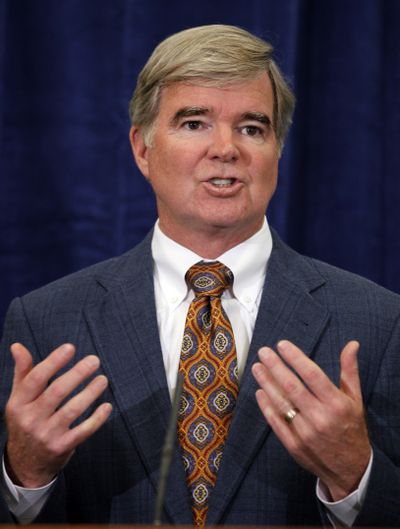Miami case brings back talk of NCAA ‘death penalty’

INDIANAPOLIS – NCAA President Mark Emmert says he’s willing to back up his tough talk on punishing rule-breakers – even using the “death penalty” as a deterrent.
With salacious allegations swirling around Miami’s football program, and one week after Emmert joined with university presidents to discuss toughening sanctions against cheating schools, the NCAA’s leader said he believed the infractions committee should make the harshest penalty an option.
“If, and I say if, we have very unique circumstances where TV bans and death penalties are warranted, then I don’t think they are off the table and I would be OK with putting those in place,” Emmert told The Associated Press in a telephone interview Friday.
Emmert later said the “death penalty,” which prohibits a school from competing in a sport, should only be used in rare cases. He was quick to distance his comments from the Miami case.
Convicted Ponzi scheme architect Nevin Shapiro has said he provided improper benefits to 72 Hurricanes football and basketball players from 2002-10 and that a handful of coaches in both programs were aware of the infractions. Yahoo Sports first reported the allegations following an 11-month investigation in which it said it audited thousands of business and financial documents and spent more than 100 hours interviewing Shapiro.
The NCAA has already spent five months investigating Miami.
Yahoo Sports also published a photo of Miami President Donna Shalala, the Health and Human Services Secretary during the Clinton Administration, standing next to Shapiro. According to Shapiro’s timeline, the infractions began when Paul Dee, a former NCAA’s infractions committee chairman, was the school’s athletic director.
While Emmert offered support for Shalala, he declined to comment on Dee.
The scope of the allegations has already created widespread debate over bringing back the “death penalty,” which has been used only once – when the NCAA canceled SMU’s 1987 football season because of a pay-for play scandal. The school decided not to play in 1988, either, as it tried to recover.
What happened at SMU has made the NCAA hesitant to use its toughest penalty again. The Mustangs posted only one winning record over the next 20 years, didn’t reach another bowl game until 2009 and the sanction is believed to have played a part in the breakup and eventual dissolution of the Southwest Conference.
Today, the implications could be worse.
In an era when conferences have so many tie-ins to bowl games, along with lucrative television contracts, all the schools in a league could lose revenue.